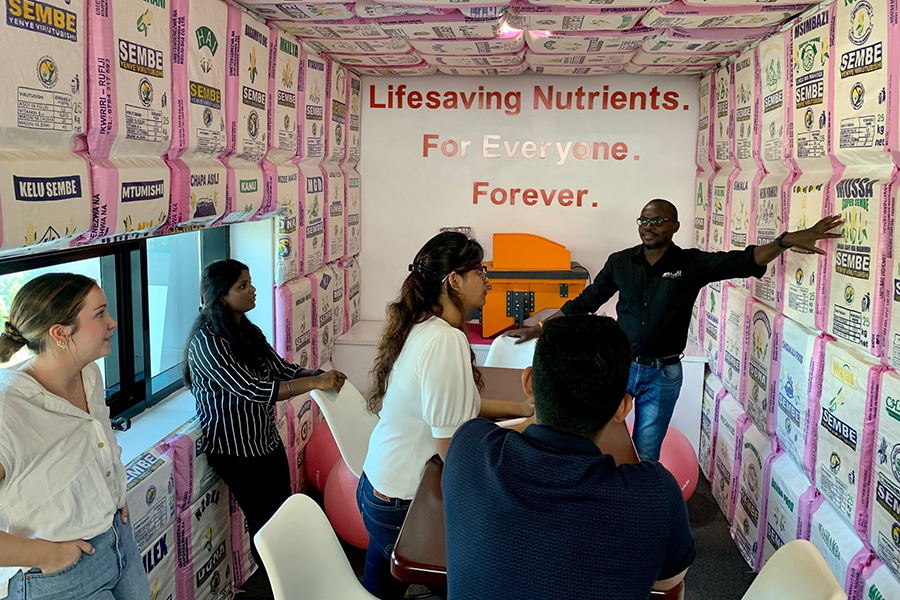Engineering Management Social Innovations course explores power of experiential learning on startups in Africa

Alexandra McGrail, Andrew Ravi Kamalraj, Akriti Srivastava and Diva Sharma weaved through stacks of empty pink and white flour sacks. Nearby, vibrant orange and black machines hummed as they blended life-saving nutrients into maize flour.
Wilson Chonjo, head of supply chain at the food fortification startup Sanku, explained how the company prints and delivers nearly 800,000 flour sacks to partner flour mills each month across Tanzania, Africa. Soon, they hope to double their operation, but refining the supply chain has been challenging. Chonjo looked eagerly toward the four Purdue University Master of Engineering Management students, hoping they had innovative ideas to streamline processes.
“We knew Sanku wanted to reach as many people that need fortified flour as possible. In our minds, the first step was optimizing the distribution center,” McGrail said.
The engineering management program has a 10-year history of helping engineering students develop in-demand professional skills through a combination of career advising and mentoring and technical, management and business courses. Today, the program is one of the most selective master’s programs at Purdue and is recognized as one of the top forward-thinking engineering management programs in the United States by The Master of Engineering Management Programs Consortium (MEMPC), listed among Dartmouth, Duke, MIT, Northwestern and Johns Hopkins programs. In 2021, Purdue also became the first American university to partner with Social Impact Startup Academy (SISTAC) to create an international experiential learning course within engineering management called Social Innovations.
“Learning theory tells us that only applied knowledge is remembered,” said Andre Habisch, co-founder of SISTAC. “Students learn to deal with unforeseen events and have to adapt their original plans to applicable solutions. Connecting them with social impact startups in Africa creates a win-win as their business knowledge can make a big difference for founders.”
The three-credit-hour course utilizes SISTAC’s action-learning framework that connects students with social enterprises and entrepreneurs in sub-Saharan African countries. With support from the organization’s co-founder, primary funder and partner, Bayer Foundation, graduate students apply their unique blend of engineering, business and management skills to help social impact startups optimize operations and scale efficiently, driving measurable positive social impact in communities.
“The action learning approach is novel and innovative in executive and management education in general because it’s not a theoretical exercise. It’s something you need to perform and deliver because otherwise your counterpart is going to have an issue and beneficiaries are not going to benefit from the solution they offer,” says Stefan Wilhelm, associate director of social impact at Bayer Foundation. “We’re talking about actual social change or benefit for marginalized groups in the Global South.”
Since its pilot program in the fall of 2021, the Purdue course has connected ten teams of students to startup projects in East Africa. One cohort designed a shipping container-style mobile healthcare clinic for island communities in Uganda and created a business model enabling profitability for the clinic in a lower SES community. All projects were virtual until this past semester, when the Social Innovations team voluntarily traveled to Tanzania during spring break to meet the Sanku team in person after two months of research and virtual communication.
During the trip, students learned that applying knowledge in the field isn’t always straightforward.
“In class, we learned about the philosophy of Kaizen continuous improvement, that you can always improve yourself and always improve processes. But when you implement that in a real project, it's like, OK, how do we do that?” Ravi Kamalraj said. “Those skills improved for me during this project.”
A different cultural context also brought new considerations to light for McGrail.
“I didn't realize how big of an influence the government has on African companies,” she said. “We learned how they're tackling these issues and communicated with government officials on how to make fortification mandatory because once fortification is enforced at the small-scale mill level, it will skyrocket Sanku’s business and scaling.”
After their visit with Sanku, McGrail, Ravi Kamalraj and the Social Innovations team presented cost-effective implementation-ready recommendations, including restructuring the warehouse and coordinating with government officials to advocate for fortified food.
“The path to scale is all about innovation,” said Felix Brooks-church, co-founder of Sanku. “Students often think outside the box — their creative juices are flowing. We're doing something that no one's ever done before in markets that are extremely challenging. It really takes that bravery of creativity and innovation that young students have to try different things.”
The Social Innovations course connects the innovative power of students to social impact startups like Sanku, which relies on fresh ideas and unique perspectives to enhance its impact. However, the benefits of the course extend beyond today’s projects. It’s also shaping our next generation of leaders, explains Eric VandeVoorde, senior director of professional master’s programs in engineering.
“When our students have this unique kind of transformative experience, it shifts their perspective. As a result, they are better equipped to make effective business decisions for their future companies,” he said. “Yet, they are also thinking about the impact of those decisions on communities and actual human beings.”
